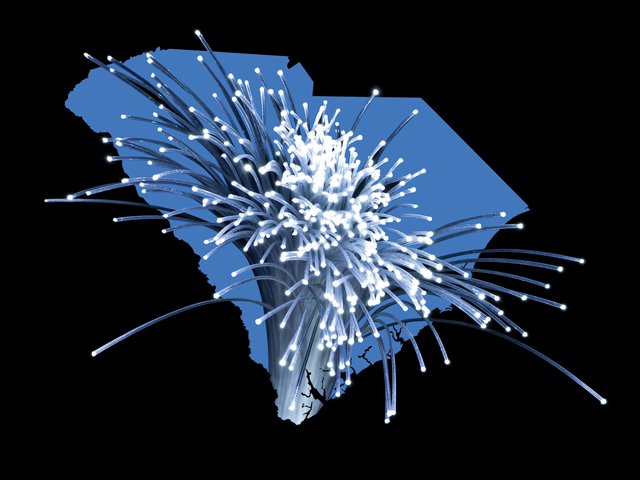
Making new connections
South Carolina’s not-for-profit electric cooperatives are stepping up to provide high-speed internet connections to rural communities.
Stefanie Amick had a speed problem.
Her work-at-home job as a medical transcriptionist requires Amick, a Mid-Carolina Electric Cooperative member, to exchange large digital files with her radiology clients 50 to 70 times a day, but her wireless internet connection was expensive and slow. She often burned through her monthly bandwidth allotment in two weeks, forcing Amick to drive to a local fire station to access their Wi-Fi signal when she needed to download or send files.
When she asked a cable company to extend their lines less than a mile to provide high-speed service to her road, the company declined, she says.
“They said I didn’t have a big enough business and that there weren’t enough interested people,” Amick recalls. “It was a matter of, ‘OK, I may have to find another career because the internet is not working.’”
The solution to Amick’s problem came from an unexpected source: CarolinaConnect—an initiative by Mid-Carolina Electric Cooperative and Newberry Electric Cooperative that’s building a fiber-optic data network for rural South Carolina.
The co-ops are in the initial phases of running fiber-optic cable along their existing electric distribution infrastructure, with CarolinaConnect staff handling account set-up, billing and in-home installation. More than 6,300 homes and businesses have already signed up for no-contract monthly service at speeds of 100 megabits per second (Mbps), 500 Mbps or 1 gigabit per second at prices that range from $49.95 to $89.95 for residential users and $79.95 to $199.95 for businesses.
Amick chose the 100 Mbps service, cutting her internet bill by $150 a month and making her work day more efficient.
“Before I got CarolinaConnect, to download about 15 voice jobs, it would take anywhere from 45 minutes to an hour,” she says. “I would get up and put a load of laundry in the washing machine, load the dishwasher, sweep my floors or do something around the house. Now I can’t get up out of my chair. I can download that many jobs in 30 seconds to a minute.”
While broadband internet connections may seem like an unusual offering from electric cooperatives, there’s nothing new about co-ops providing a much-needed service to rural communities, says Bob Paulling, president and CEO of Mid-Carolina Electric Cooperative.
South Carolina’s not-for-profit cooperatives formed in the 1930s and 1940s when for-profit utilities didn’t serve rural communities because they couldn’t make a return on the costly investment of extending power lines outside of cities. It was up to cooperatives to fill the void, and ultimately build what is today the state’s largest utility network.
“We’re doing essentially what our forefathers did 75 years ago,” Paulling says. “There is a need in our community. The for-profits are not fulfilling that need because they won’t get a return on their investment. They’re looking out for shareholders. We’re looking out for our members.”
Building a fiber-optic network on a pay-as-you-go basis will take time, Paulling says, but it’s a vital investment that will benefit the state for decades to come, and it’s a service that can expand wherever it’s needed. CarolinaConnect is organized as a cooperative, a business model that will allow other electric co-ops to join if feasibility studies show a need for the service in their territories.
“Every aspect of our lives as we move to the future will be all about internet connections. It’s not a luxury to have internet service, it’s become a necessity,” he says. “Internet service is the next utility you must have to really live your life like any other person.”
For more information on CarolinaConnect broadband service (currently available only in Mid-Carolina and Newberry service areas), visit carolinaconnect.com.
